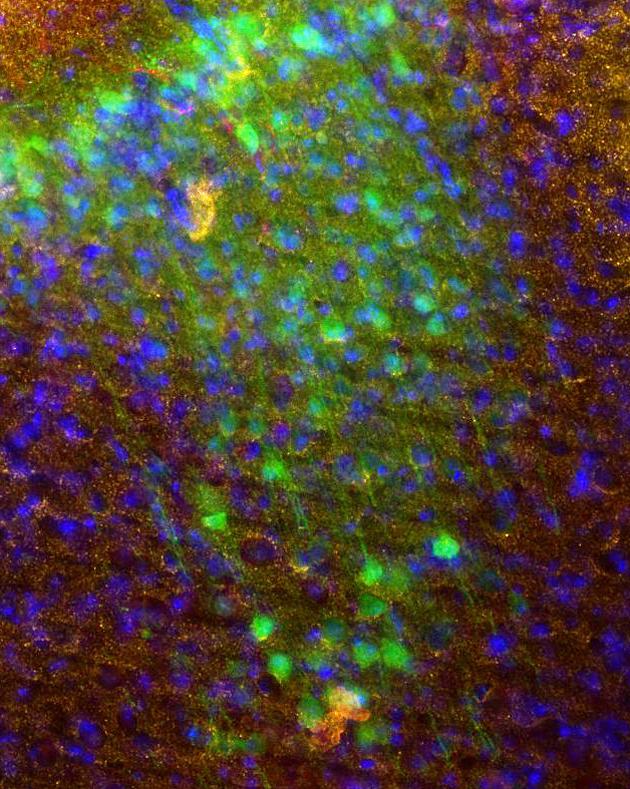Scientists at the Institut Pasteur, the French National Center for Scientific Research (CNRS) and Pierre and Marie Curie University (UPMC) have recently proven that, in mice, nicotine intake – nicotine is the main addictive substance in tobacco – is heavily regulated by a genetic mutation that is very common in humans. This mutation affects the neuronal nicotinic receptor, disrupting its function and resulting in partial inactivation of the "reward circuit". Carriers of this mutation therefore have to increase their consumption to feel the effects of tobacco. These results, published online on December 3, 2013 in Molecular Psychiatry, pave the way for the development of new smoking cessation treatments that target carriers of this mutation.
Press release
Paris, December 12, 2013

The teams led by Uwe Maskos, who heads the Integrative Neurobiology of Cholinergic Systems Unit at the Institut Pasteur / CNRS, and by CNRS scientist Philippe Faure, who manages the Neurobiology of Adaptive Processes laboratory (CNRS / UPMC), have recently made a discovery proving that nicotine addiction may be influenced by an individual's genetic heritage. These scientists show that, in mice, a genetic mutation resulted in a marked reduction in sensitivity to nicotine. Carriers of this gene therefore require a higher dose of tobacco than non-carriers in order to obtain the same amount of pleasure - somewhere on the order of three times more.
The mutation characterized by the scientists affects part of the nicotinic receptor. The presence of this mutation disrupts the normal function of the nicotinic receptor, partially inactivating the "reward circuit".
This mutation occurs frequently in humans. Other studies suggest that it is present in 35% of Europeans, and in nearly 90% of heavy smokers.
These discoveries pave the way for the development of "personalized" smoking cessation treatments for individuals who carry this genetic mutation.
Illustration: © Institut Pasteur
The genetic mutation in humans that regulates nicotine dependence is expressed here in mice that have undergone modifications to a specific region of the cortex (in green). Cell nuclei in blue. Confocal laser scanning microscopy.
SOURCE
Nicotine consumption is regulated by a human polymorphism in dopamine neurons, Molecular Psychiatry, December 3, 2013.
C Morel (1,9), L Fattore (2,9), S Pons (3), YA Hay (4), F Marti (1), B Lambolez (4), M De Biasi (5), M Lathrop (6,7), W Fratta (8), U Maskos (3,9) and P Faure (1,9)
(1) Neurobiologie des Processus Adaptatifs, CNRS UMR 7102, Equipe Neurophysiologie et comportement (NPC), Université P. et M. Curie, Paris, France
(2) CNR Neuroscience Institute, Cagliari, National Research Council, Italy, Cittadella Universitaria, Monserrato, Italy
(3) Institut Pasteur, Unité Neurobiologie intégrative des systèmes cholinergiques, CNRSUMR 3571, Paris, France
(4) Université P. et M. Curie, CNRS UMR 7102, Neurobiologie des Processus Adaptatifs, Equipe Réseau cortical et couplage neurovasculaire, Paris, France
(5) Department of Psychiatry, Perelman School of Medicine at the University of Pennsylvania, Philadelphia, PA, USA
(6) McGill University and Genome Quebec Innovation Centre,Montréal, QC, Canada
(7) Fondation Jean Dausset, CEPH, Paris, France
(8) Department of Biomedical Sciences, University of Cagliari Cittadella Universitaria, Monserrato, Italy.
(9) These authors contributed equally to this work.
CONTACTS PRESSE
Press office
Marion Doucet - 01 45 68 89 28 - marion.doucet@pasteur.fr
Nadine Peyrolo - 01 45 68 81 47 - nadine.peyrolo@pasteur.fr
Marion Doucet - 01 45 68 89 28 - marion.doucet@pasteur.fr
Nadine Peyrolo - 01 45 68 81 47 - nadine.peyrolo@pasteur.fr
- See more at: http://www.pasteur.fr/fr/institut-pasteur/presse/documents-presse/premier-modele-humain-pour-la-maladie-neurodegenerative-sanfilippo#sthash.Vh5aaLbM.dpuf


